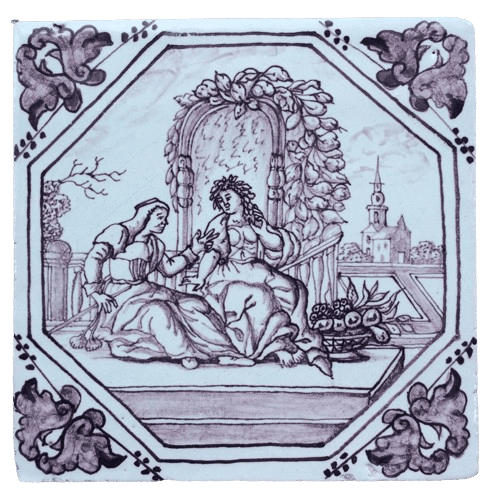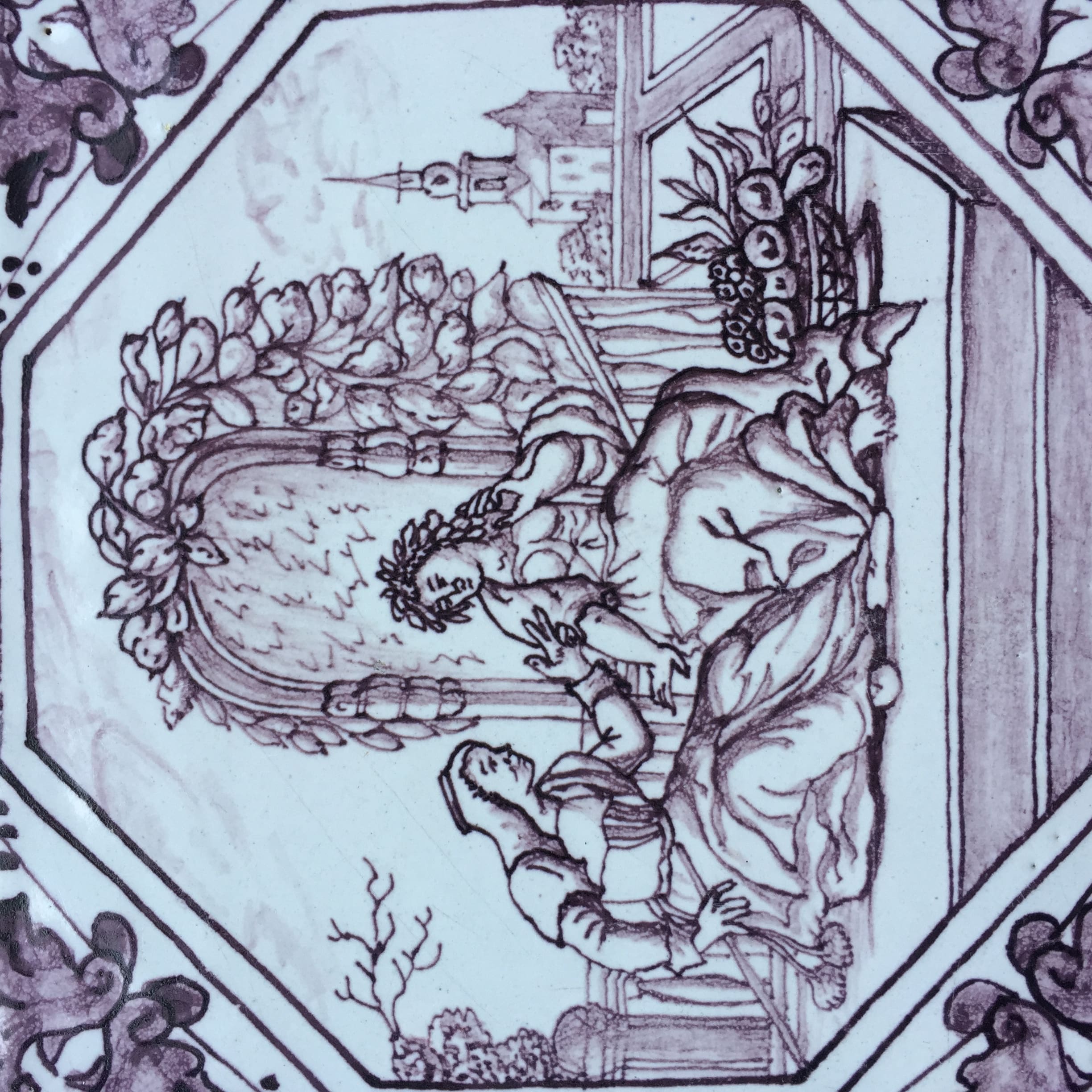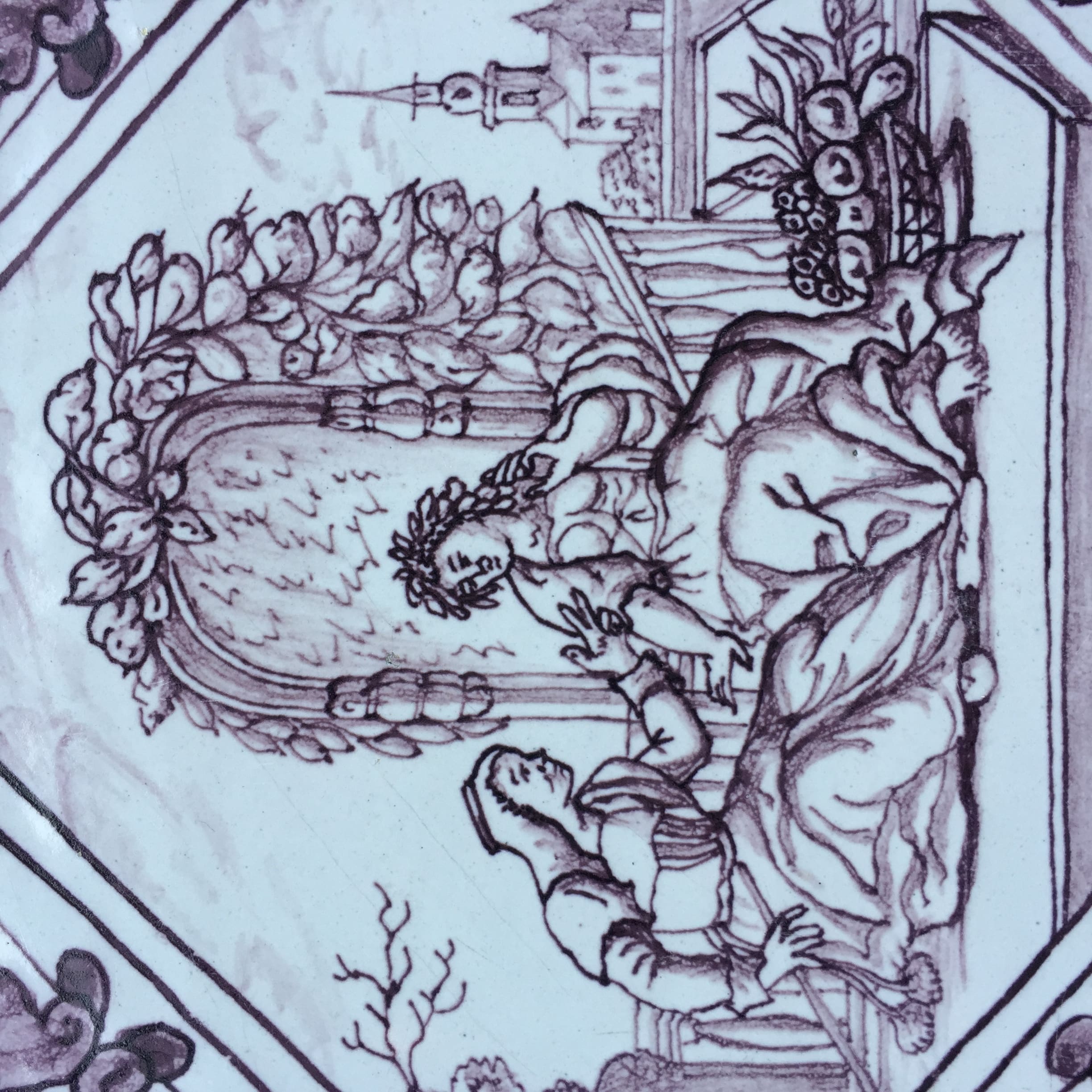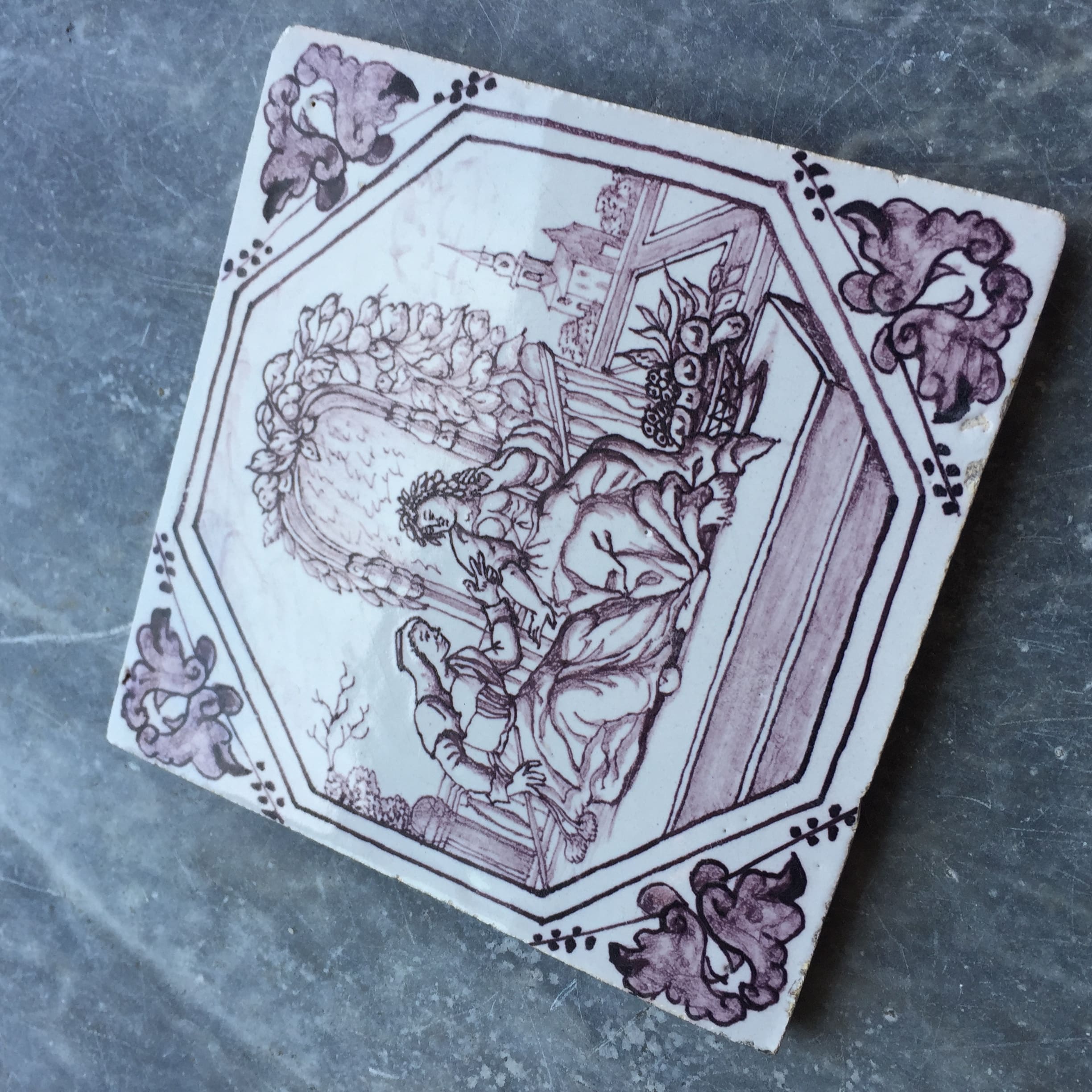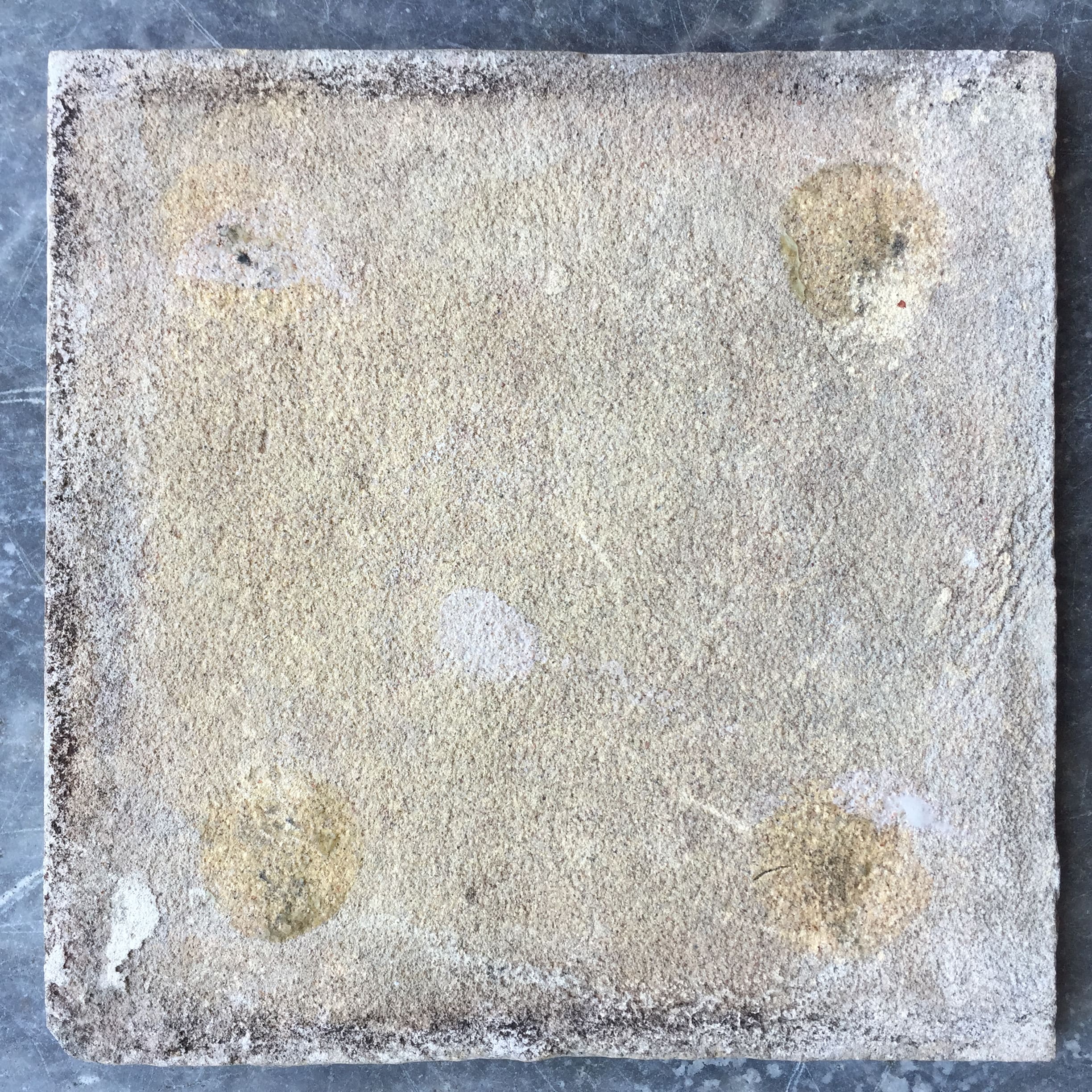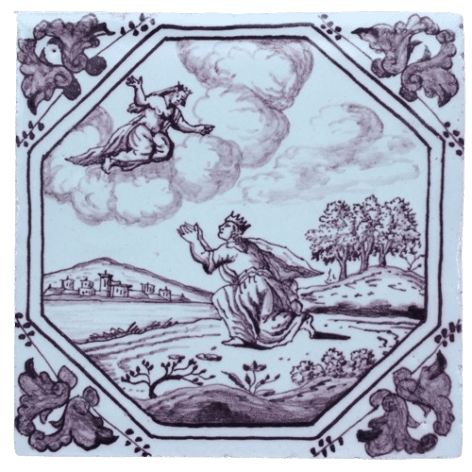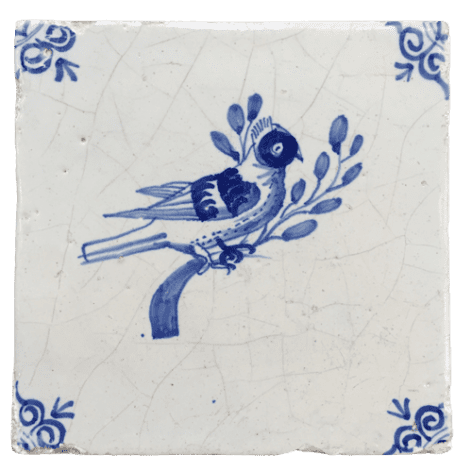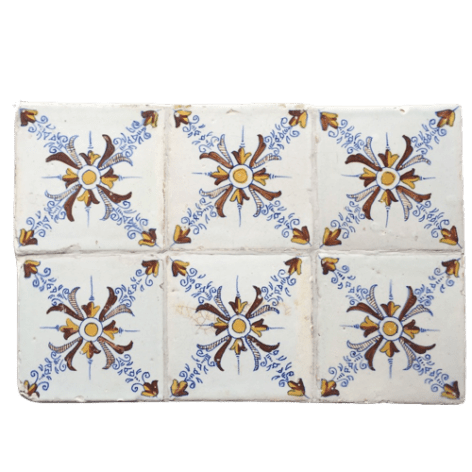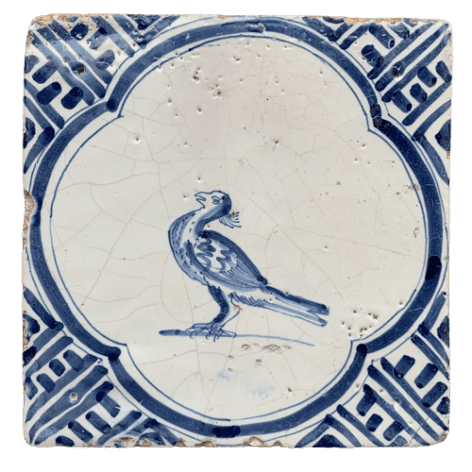| Your cart is currently empty. |
Vertumnis & Pomona
€450
Vertumnis & Pomona
€450
In stock
Rotterdam
Ca. 1740
Atelier Hendrick Schut
A very fine painted tile with mythological decoration after Ovidius.
What is special is that this tile has a decoration from Roman mythology, which is not related to the Greek, like all the other stories stories. This and the other on my site are the only known ones depicted on tiles.
The Roman legend of Vertumnus and Pomona, Ovid 14, 622-771;
”Pomona lived in this king’s reign. No other hamadryad, of the wood nymphs of Latium, tended the gardens more skilfully or was more devoted to the orchards’ care, hence her name. She loved the fields and the branches loaded with ripe apples, not the woods and rivers. She carried a curved pruning knife, not a javelin, with which she cut back the luxuriant growth, and lopped the branches spreading out here and there, now splitting the bark and inserting a graft, providing sap from a different stock for the nursling. She would not allow them to suffer from being parched, watering, in trickling streams, the twining tendrils of thirsty root. This was her love, and her passion, and she had no longing for desire. Still fearing boorish aggression, she enclosed herself in an orchard, and denied an entrance, and shunned men.
What did the Satyrs, fitted by their youth for dancing, not do to possess her, and the Pans with pine-wreathed horns, and Silvanus, always younger than his years, and Priapus, the god who scares off thieves, with his pruning hook or his phallus? But Vertumnus surpassed them all, even, in his love, though he was no more fortunate than them. O how often, disguised as an uncouth reaper, he would bring her a basket filled with ears of barley, and he was the perfect image of a reaper! Often he would display his forehead bound with freshly cut hay, and might seem to have been tossing the new-mown grass. Often he would be carrying an ox-goad in his stiff hand, so that you would swear he had just unyoked his weary team. Given a knife he was a dresser and pruner of vines: he would carry a ladder: you would think he’d be picking apples. He was a soldier with a sword, or a fisherman taking up his rod.
In short, by his many disguises, he frequently gained admittance, and found joy, gazing at her beauty. Once, he even covered his head with a coloured scarf, and leaning on a staff, with a wig of grey hair, imitated an old woman. He entered the well-tended garden, and admiring the fruit, said: ‘You are so much more lovely’, and gave her a few congratulatory kisses, as no true old woman would have done. He sat on the flattened grass, looking at the branches bending, weighed down with autumn fruit. There was a specimen elm opposite, covered with gleaming bunches of grapes. After he had praised it, and its companion vine, he said: ‘But if that tree stood there, unmated, without its vine, it would not be sought after for more than its leaves, and the vine also, which is joined to and rests on the elm, would lie on the ground, if it were not married to it, and leaning on it.
But you are not moved by this tree’s example, and you shun marriage, and do not care to be wed. I wish that you did! Helen would not have had more suitors to trouble her, or Hippodamia, who caused the Lapithae problems, or Penelope, wife of that Ulysses, who was delayed too long at the war. Even now a thousand men want you, and the demi-gods and the gods, and the divinities that haunt the Alban hills, though you shun them and turn away from their wooing. But if you are wise, if you want to marry well, and listen to this old woman, that loves you more than you think, more than them all, reject their vulgar offers, and choose Vertumnus to share your bed! You have my assurance as well: he is not better known to himself than he is to me: he does not wander here and there in the wide world: he lives on his own in this place: and he does not love the latest girl he has seen, as most of your suitors do.
You will be his first love, and you will be his last, and he will devote his life only to you. And then he is young, is blessed with natural charm, can take on a fitting appearance, and whatever is ordered, though you ask all, he will do. Besides, that which you love the same, those apples you cherish, he is the first to have, and with joy holds your gifts in his hand! But he does not desire now the fruit of your trees, or the sweet juice of your herbs: he desires nothing but you. Take pity on his ardour, and believe that he, who seeks you, is begging you, in person, through my mouth. Fear the vengeful gods, and Idalian Venus, who hates the hard-hearted, and Rhamnusian Nemesis, her inexorable wrath! That you may fear them more (since my long life has given me knowledge of many tales) I will tell you a story, famous through all of Cyprus, by which you might easily be swayed and softened.’
Painted after engravings of Crispijn de Passe (1602).
Specifications
We provide free worldwide shipping on all orders above € 75. We understand the value and importance of your antique items. That’s why we prioritize safe and secure shipping, ensuring that your antiques are protected every step of the way. Using only the highest quality packing materials, such as heavy-duty cardboard boxes, bubble wrap, foam, and foam chips, to ensure that your items are protected during transit. Each shipment is fully insured and prepared with all the required documents to pass customs when ordering from outside the European Union. By using only expert shippers such as UPS and DHL, required documents are directly sent to customs to ensure a smooth and fast delivery.
The authenticity of all objects is guaranteed. When ordering an object, a certificate of authenticity will be provided with your purchase. All tiles are handmade antiques that are hundreds of years old, therefore it is quite common that the tiles have small chips and signs of use, and are considered to be part of the life a tile had and the story it tells.

